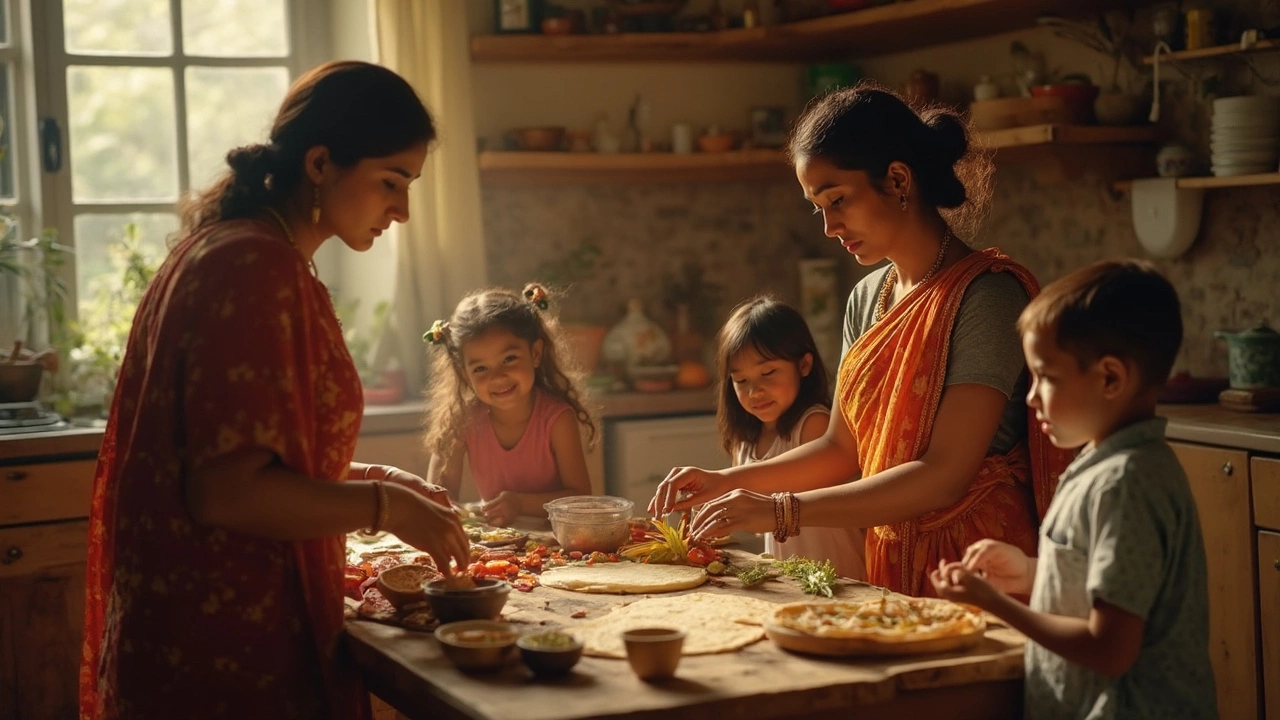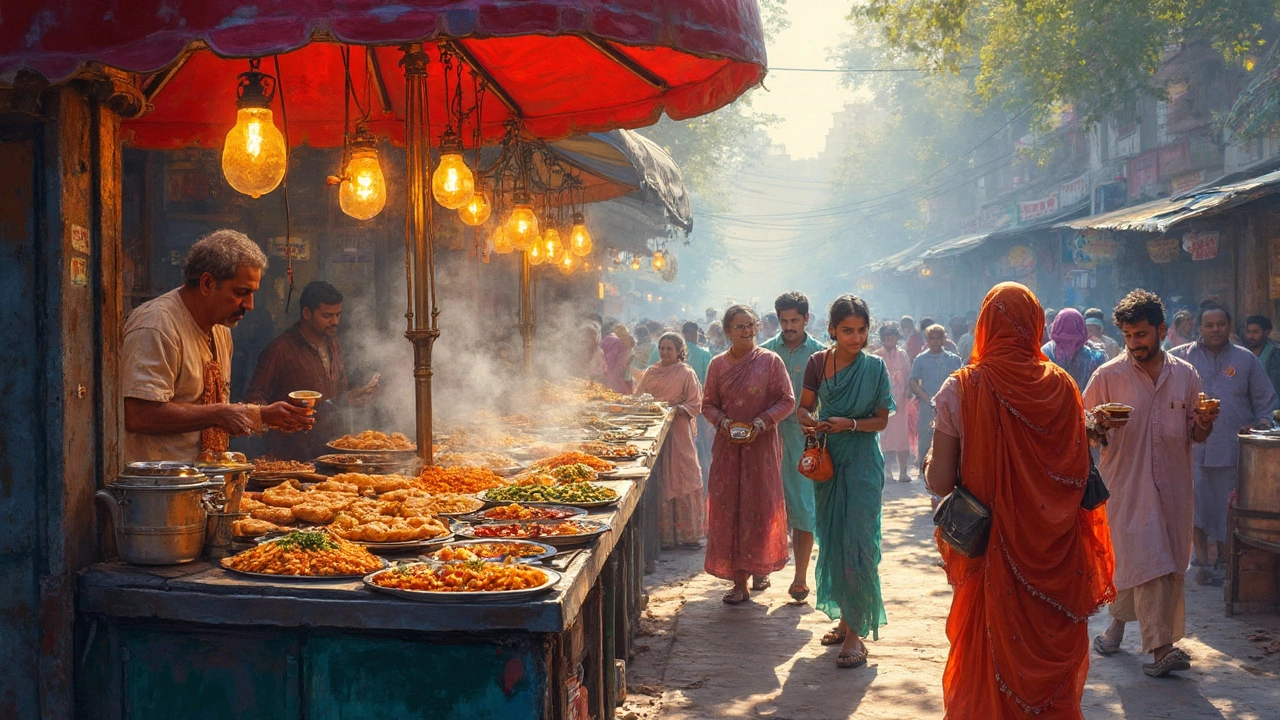Have you ever wondered why vegetarian dishes are such a big deal in India? It's not just about the spices—it runs way deeper. India's love affair with vegetarian food comes from a mix of history, religion, and sheer biodiversity. Vegetarian meals are a staple, thanks to the huge variety of ingredients the country has to offer.
First off, let’s talk roots. Many Indian religions, like Hinduism and Jainism, promote vegetarianism. These beliefs have shaped dietary habits over centuries, influencing countless dishes. It’s not just about following a diet—it’s a lifestyle, a choice that resonates with many.
Then there’s the diversity in ingredients. Ever heard of paneer, chickpeas, or lentils? These are just a few stars in the vegetarian line-up. India’s climate allows for an abundance of fresh produce, herbs, and spices, making vegetarian cooking easy and exciting. Who knew carrots and peas could make mouths water?
- Historical and Religious Roots
- Diversity of Vegetarian Ingredients
- Popular Vegetarian Dishes
- Health Benefits of Vegetarian Diets
- Tips for Cooking Indian Veg Dishes
Historical and Religious Roots
So, why are vegetarian dishes such a hit in India? It's all connected to the country's rich history and religious beliefs. For starters, Hinduism, which is practiced by around 80% of the population, has a huge influence. Many Hindus avoid meat due to the principle of 'ahimsa,' which means non-violence towards all living beings. This belief makes vegetarianism not just a diet choice but a spiritual commitment for many.
Let's not forget Jainism, which takes non-violence to the next level. Jains avoid not only meat but also root vegetables like potatoes and onions, as uprooting the plant can harm it. This leads to some pretty creative vegetarian Indian dishes, let me tell you!
Ancient and Medieval Indian History
If we go way back in time, vegetarianism was not always the norm. Ancient texts from India reveal that meat was consumed until around 300 BC. It was during the rise of spiritual philosophies that vegetarian food began to gain prominence. In the medieval period, various dynasties that ruled India, like the Mughals, embraced vegetarianism due to their devotional practices.
Cultural Transmission and Practices
What's fascinating is how these beliefs trickled down through cultural practices. Festivals often include elaborate vegetarian meals, each with its own significance. During Navratri, for instance, many people eat only vegetarian food as a form of worship. These practices have been passed down through generations, ingraining vegetarian Indian meals in the culture.
So, vegetarianism isn't just a trend in India—it's a tradition that has evolved through history and belief systems, making the vegetarian table not just a place for food, but a reflection of values and history.
Diversity of Vegetarian Ingredients
India's vibrant tapestry of vegetarian Indian dishes is woven from an incredible variety of ingredients. Forget plain old vegetables; we're talking a whole universe of delicious and nutritious food.
Legumes and Pulses
Chickpeas, lentils, and beans are the backbone of many recipes. Take chickpeas, for instance. They're the star of chana masala, a spicy, tangy dish that's a staple in north Indian cuisine. As for lentils, you can't mention India without thinking of dal. It's comforting, tasty, and comes in hundreds of variations based on region.
Grains Galore
Rice and wheat are staples in Indian meals. From fluffy basmati to hearty whole wheat chapatis, grains are indispensable. Ever tried a dosa? This south Indian favorite is a crispy crepe made from fermented rice and lentil batter, perfect for breakfast or dinner!
Dairy Staples
Let’s not forget paneer, India’s beloved cheese. Made from curdled milk, paneer is a versatile ingredient found in several vegetarian meals, like paneer butter masala, which is creamy, rich, and utterly satisfying.
Fruits and Vegetables
With a climate that favors growth all year round, Indian markets are bursting with fresh produce. Think tomatoes, okra, eggplants, and leafy greens like spinach. Each adds a unique flair to dishes, creating flavors that are anything but boring.
Spices and Herbs
No discussion about Indian cuisine is complete without spices. Turmeric, cumin, coriander, and more are staples. They transform simple ingredients into mouth-watering meals. Also, fresh herbs like cilantro and mint provide that extra punch to elevate a dish from good to unforgettable.
Whether you're whipping up a simple curry or a lavish fest, the diverse and exciting world of ingredients in India is sure to make your culinary journey a memorable one!

Popular Vegetarian Dishes
Now, let’s get to the fun part—what's cooking in the Indian vegetarian kitchen? The range of vegetarian Indian dishes is mind-blowing. From street snacks to full-on meals, these dishes are bursting with flavor and tradition.
Chole Bhature
This North Indian favorite is a match made in heaven. Spicy chickpeas, or 'chole,' pair perfectly with 'bhature'—fluffy fried bread. Often enjoyed as a hearty breakfast, this dish is super popular in Delhi and Punjab. Remember, it's served best with a side of pickle and onion.
Paneer Tikka
If you're into barbecues, this one’s a winner. Cubes of paneer marinated in spices, then grilled to perfection. It's smoky, spicy, and a crowd-pleaser at gatherings. Best part? It’s protein-packed, thanks to the paneer.
Masala Dosa
Originating from the South, this is not just a dish—it’s an experience. A crisp, thin crepe made from fermented rice and lentil batter, stuffed with spicy mashed potatoes. It's usually enjoyed with coconut chutney and sambar on the side.
Palak Paneer
This dish brings together spinach and paneer in a creamy, spiced gravy that’s pretty irresistible. It’s nutritious, given the high iron content from spinach. Serve it with naan or rice for a meal that’s all about comfort.
Rajma
Think of it as India’s version of chili, but vegetarian. Red kidney beans cooked in a luscious tomato gravy, full of spices. It's typically served with rice, making 'Rajma Chawal' a household staple, especially in North India.
The variety in these dishes shows how versatile and rich Indian cuisine can be, even without meat. They’re not only popular in India but have fans all over the world! So, why not try whipping up one of these dishes yourself? You might just start a new kitchen tradition.
Health Benefits of Vegetarian Diets
Switching to a vegetarian diet can do wonders for your health. Seriously. It’s not just about munching on greens; it’s about embracing a lifestyle that can boost your well-being in numerous ways.
Reduced Risk of Chronic Diseases
Vegetarian diets fill your plate with fruits, vegetables, whole grains, and nuts, which are packed with nutrients. This mix helps lower the risk of heart disease, Type 2 diabetes, and certain cancers. Thanks to the high fiber content and low saturated fat, your heart says a big thank you!
Weight Management
Are you looking to shed some pounds or maintain a healthy weight? A vegetarian diet might just be your answer. These diets tend to be lower in calories while being nutrient-rich, helping you feel fuller for longer. Say goodbye to unwanted cravings!
Better Digestion
The fiber found in fruits, veggies, and grains works wonders on your digestive system. It helps keep things moving smoothly, reducing the risk of constipation and other digestive issues. Your gut will love you for it.
Nutrient Powerhouse
Worried about missing out on nutrients? Relax. Vegetarian diets are brimming with vitamins, minerals, and antioxidants that keep you feeling energetic and support your immune system. Just make sure you’re getting enough protein, iron, and B12 by including ingredients like lentils, chickpeas, and fortified products.
A Closer Look at the Numbers
| Nutrient | Vegetarian Source | Daily Value (%) |
|---|---|---|
| Fiber | Chickpeas (1 cup) | 50% |
| Vitamin C | Bell Peppers (1 medium) | 169% |
| Iron | Spinach (1 cup, cooked) | 36% |
It’s clear that vegetarian Indian dishes not only tantalize the taste buds but also pack a punch in terms of health benefits. So, why not try adding more of them to your meals?

Tips for Cooking Indian Veg Dishes
Cooking vegetarian Indian dishes might seem a bit daunting at first, but with some handy tips, you can totally rock it. Indian cuisine is all about balancing flavors, textures, and aromas. Let’s dive into how you can make your veg dishes as authentic and delicious as a pro.
Spices Are Your Best Friends
Indian cooking often revolves around spices. If you want to nail it, familiarize yourself with basic spices like cumin, coriander, turmeric, and garam masala. These are the backbone of most Indian meals. A little pro tip: always roast whole spices before grinding or using them to enhance their flavor.
Embrace Fresh Ingredients
Fresh veggies are key in Indian cuisine. Try to use seasonal produce for the best taste and nutritional benefits. Veggies like spinach, cauliflower, and carrots frequently star in many delicious dishes. And don’t forget to wash and chop them finely to make cooking easier and more effective.
Master the Art of Tempering
Tempering, or ‘tadka’, is a technique that involves frying spices in hot oil or ghee to release their full aroma. This step is essential in many vegetarian Indian dishes. Perform this at the beginning or end of cooking, and watch how it elevates the flavor of your dish completely.
Know Your Lentils and Grains
Lentils, rice, and flatbreads are staples. Learn how to cook different types of dal and rice. Using a pressure cooker can save time and lock in nutrients, especially for hard pulses. When cooking rice or grains, a little salt and a touch of ghee can do wonders.
Balancing Flavors
Indian cuisine is about balance: sweet, sour, spicy, and salty need to work in harmony. Taste your food as you cook to adjust these elements. Adding lemon juice or yogurt can add tanginess, while a bit of sugar can soften spiciness.
With these tips in hand, your foray into the world of Indian vegetarian cooking doesn’t have to be a one-way trip to ‘recipe disaster’ town. Start with simple dishes and, before you know it, you'll be cooking up amazing meals that even your local Indian restaurant would envy!
